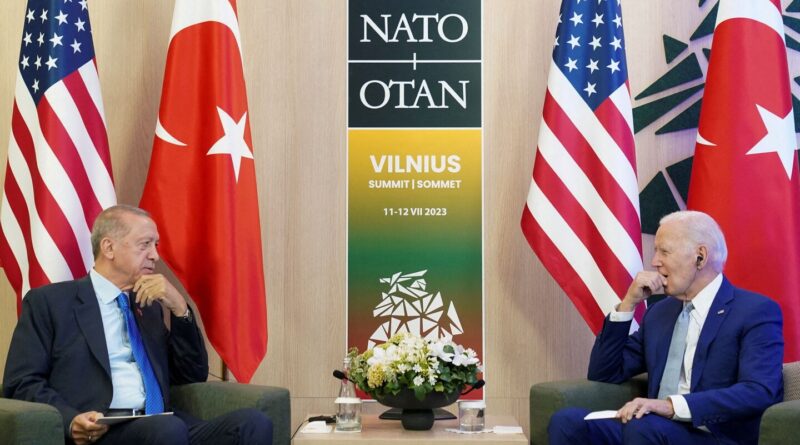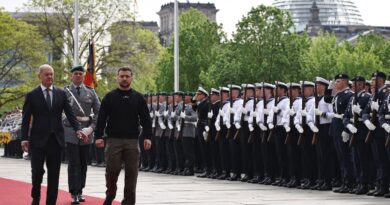Greece request for U.S. fighter jets sticking point for Turkey’s F-16s
Greece — Turkey’s longtime regional rival — wants F-35s, the most advanced U.S. fighter jets, a pending purchase that has been in limbo. And though senior members of Congress appear to have softened their opposition to Turkey’s F-16 request following Ankara’s agreement to drop its objections to Sweden’s NATO accession, they have linked the two deals.
“I am continuing to have my reservations on the F-16,” Senate Foreign Relations Committee Chairman Robert Menendez (D-N.J.) told The Washington Post this week after the Sweden announcement at NATO’s summit in Vilnius, Latvia.
“But I have said to the administration, if they can show me … there has been a lull in [Turkey’s] belligerence against [Greece], if they can show me the pathway where Greece has a qualitative military edge,” he said, “then there may be a path forward.”
House Foreign Affairs Committee Chairman Michael McCaul (R-Calif.) agreed, as did the ranking Democratic members on both committees. “Chairman McCaul has said he could be in favor of upgrades for Turkey’s existing F-16s if Greece receives the F-35 and that Washington first has to ensure Greece has a military advantage over Turkey,” said McLaurine Pinover, a spokesperson for the committee majority.
President Biden connected the two sales in a pre-summit interview with CNN’s Fareed Zakaria aired Sunday. “Turkey is looking for modernization of F-16 aircraft. And [Prime Minister Kyriakos] Mitsotakis in Greece is also looking for some help,” Biden said. “And so what I’m trying to quite frankly put together is a little bit of a consortium here where we’re strengthening NATO in terms of the military capacity of both Greece as well as Turkey, and allow Sweden to come in. But it’s … in play. It’s not done.”
The administration has said it supports both the F-16 and F-35 deals and sent them to Congress months ago for informal discussion in advance of submitting them for formal approval by lawmakers. But as both have taken on additional political and foreign policy leverage, that official submission has never come.
Asked about when either or both would be formally submitted — triggering a 15-day period during which Congress can object — the White House declined to expand on Biden’s remarks. The Pentagon referred questions to the State Department, which is officially in charge of handling foreign military sales. State Department spokesperson Matthew Miller said only that “it is in process.”
Greek-Turkish feuds — stretching back to Greece’s independence from the Ottoman Empire in the 19th century, before the formation of modern Turkey — have been the stuff of legend in more modern times at NATO. Most disputes have revolved around air, sea and land control of the eastern Mediterranean and the Aegean Sea, focusing in recent years over energy fields and pipelines, occupation of Aegean islands and responsibility for migrants coming by sea from Africa and the Middle East.
Less than a year ago, tensions between Athens and Ankara soared so high that Turkish President Recep Tayyip Erdogan appeared to threaten an armed response to what he said was Greek occupation of islands that are supposed to be demilitarized. Mitsotakis said Turkey’s questioning of Greek sovereignty was “absurd.”
The uproar caused the cancellation of a scheduled meeting between the two leaders, who had avoided each other until they finally sat down together Wednesday in Vilnius. There, Erdogan later told reporters in a tone far different than his comments about Athens last year, they spoke about how to “enhance their friendship.”
Erdogan said he was “hopeful” that the United States would provide F-16s to Turkey and added that their delivery posed no threat to Greece.
The meeting capped a slow process of normalization of relations that has been underway in the last several months, beginning with Greece’s public sympathy and humanitarian outreach following February’s devastating earthquake in southern Turkey.
The normalization process “was very much seen as a factor in Turkey’s broader effort to improve ties with the West,” said Berkay Mandiraci, a senior analyst with the International Crisis Group.
Mitsotakis, who was reelected last month, said that he and Erdogan had “confirmed our joint will for a new restart of our bilateral relations, for a cautious new beginning,” and that they would meet again in the fall.
“All standing issues have not been resolved, obviously,” he said, “but there is an intention for revisiting the framework of our relations from a positive angle.”
As part of an overall defense modernization, Greece has purchased 24 Rafale fighter jets and upgrades to its existing F-16 fleet. It also wants to buy 20 F-35s, with an option to purchase as many as 28 more.
For Turkey, improving relations with Greece is seen as desirable, not just to lure Western investors at a time when its economy is suffering, but also to signal to the “political elite in Europe that this is a different era — a shift away from what they perceived as escalatory rhetoric and action,” defined by Erdogan’s caustic nationalism in the period before elections in May won him another five years in office, Mandiraci said.
A small but active Greek American presence in Congress, along with Erdogan’s crackdowns on political opposition, dissent and the media, have exacerbated the disdain in which many lawmakers hold him. It has grown since Turkey, in 2017, signed a $2.5 billion agreement for the purchase of Russia’s S-400 air defense system.
That deal led to harsh criticism from NATO and Washington’s suspension of Turkey’s participation in the F-35 production and purchase program along with other defense contracts. Those sanctions still exist.
The provision of U.S. fighter jets to both countries would not necessarily derail the current atmosphere of normalization between them. But Greece’s possession of America’s most sophisticated aircraft, if it remains denied to Turkey, could be worrying for Ankara “not now, but in 10 to 15 years,” according to some defense analysts, Mandiraci said.
It is impossible to predict whether Turkey, by then, will have resolved its differences with the United States over the purchase of Russian air defense systems or if there is a path to reenter the F-35 program. For the moment, in the wake of reelection, Erdogan appears to have concluded that he has little to gain by continuing the feud with either Washington or Athens.
Although both Turkey and Greece are well aware of the “cost of serious escalation,” Mandiraci said, their current rapprochement, such as it is, will not necessarily more forward quickly, given pressure Erdogan faces from nationalist partners in his ruling coalition.
“The wiggle room he has in making substantial concessions is relatively narrow,” he said.
Fahim reported from Istanbul. Emily Rauhala and Michael Birnbaum in Vilnius and Leigh Ann Caldwell in Washington contributed to this report.




